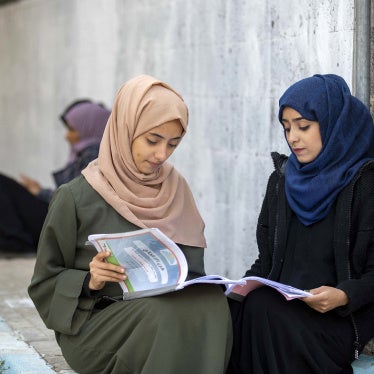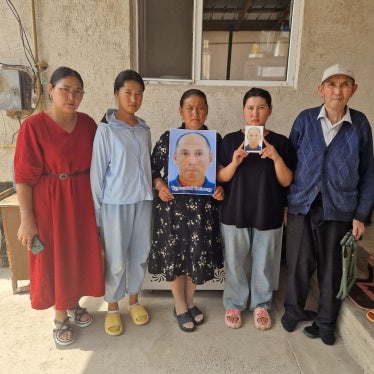Update:Iran hanged Reyhaneh Jabbari in Tehran this morning. She was 26.
(October 24, 2014) Prison officials contacted Reyhaneh Jabbari's mother, Sholeh Pakravan, advising her to say a last goodbye to her daughter. Jabbari's mother spoke to Human Rights Watch by telephone and said that she was on her way to see her daughter, possibly for the last time.
(Beirut, October 1, 2014) – Iran’s judiciary should vacate the death sentence of Reyhaneh Jabbari and ensure that she receives a fair trial. She was convicted of murdering an older man in what she says was self defense. On September 29, 2014, prison authorities transferred Jabbari to a prison west of Tehran without explanation, raising fears that her execution was imminent, but then returned her to her original prison cell overnight.
Jabbari was arrested in 2007 and sentenced to death in 2009 by a Tehran criminal court for the murder of Morteza Abdolali Sarbandi, a doctor and a former Intelligence Ministry employee. Later that year the Supreme Court affirmed the death sentence. Jabbari admitted stabbing Sarbandi in the neck, but says that he attempted to sexually assault her. She also said that a third person in the room may have caused Sarbandi’s death. Jabbari’s lawyers contend that the judiciary did not properly investigate the cause of death and deprived their client of a fair trial. Tehran’s prosecutor’s office had been reviewing the case.
“In light of the serious substantive and procedural questions raised in this case, and the fact that it’s still under review, officials risk being complicit in irreversible harm if they execute Jabbari,” said Joe Stork, deputy Middle East and North Africa director at Human Rights Watch. “Iran’s judiciary should immediately reverse its death sentence and allow her a fair retrial.”
Sholeh Pakravan, Jabbari’s mother, told Human Rights Watch that on September 28, 2014, prison authorities allowed her and Jabbari’s lawyer to meet with her. They met in Gharchak prison, also known as Shahr-e Rey prison, in Varamin, 55 kilometers south of Tehran. Pakravan said that a day later she learned that prison authorities had transferred her daughter to Rajai Shahr prison in Karaj, and that they planned to execute her early on September 30. Pakravan said sources inside both prisons, including employees of the prisons, informed her of her daughter’s impending execution.
Pakravan told Human Rights Watch that the Tehran prosecutor’s office had been reviewing her daughter’s case file, and that the authorities had not informed her or the lawyer that they planned to execute Jabbari. Iranian law requires judiciary authorities to inform lawyers and family members in advance of an execution.
Pakravan said she and others then traveled to Rajai Shahr prison to learn more about Jabbari’s whereabouts and condition. Official and semi-official news outlets said, however, that unnamed “informed judicial sources” denied that officials had transferred Jabbari to Rajai Shahr prison, or that they planned to execute her.
A source familiar with the case told Human Rights Watch on the morning of September 30 that Jabbari had contacted her mother a few hours earlier from Gharchak prison to tell her that she was alright, and that plans to execute her had been halted for the time being. Another informed source said that authorities presented documents to the family showing they had transferred Jabbari back to Gharchak prison on September 29.
Pakravan said that no official has informed her or her family that the execution order has been halted, and she believes her daughter’s life is still in imminent danger. Iran’s judiciary previously halted Jabbari’s execution in April 2014 to review the conviction and death sentence.
Mohamed Ali Jedari Foroughi, Jabbari’s lawyer until recently, told Human Rights Watch that during the six months he was in charge of Jabbari’s case, prison authorities only allowed him to visit her twice. He said judiciary officials prevented him from examining Jabbari’s case file while Tehran prosecutor’s office was reviewing it despite the serious questions and ambiguities about Sarbandi’s cause of death. According to other reports, officials placed Jabbari in solitary confinement immediately after her arrest for two months and denied her access to a lawyer or her family.
Under Iranian law, in murder cases, the victim’s survivors retain the right to claim retribution in kind, to pardon the alleged killer, or to accept compensation in exchange for giving up the right to claim retribution. Sarbandi’s family has refused to pardon Jabbari. In 2014, Iran’s judiciary has executed at least 500 prisoners, many of them on murder charges, according to rights groups.
Human Rights Watch has called on Iran’s judiciary to impose a moratorium on all executions in the country due to serious concerns regarding substantive and due process violations leading to Iran’s implementation of the death penalty. Human Rights Watch opposes the death penalty in all circumstances because it is an inherently irreversible, inhumane punishment.
“It is unconscionable that in addition to enduring the pain of having their daughter on death row, Jabbari’s parents must also deal with a judiciary that refuses to play by its own rules and fails to provide them with sufficient and clear information regarding her condition,” Stork said.







